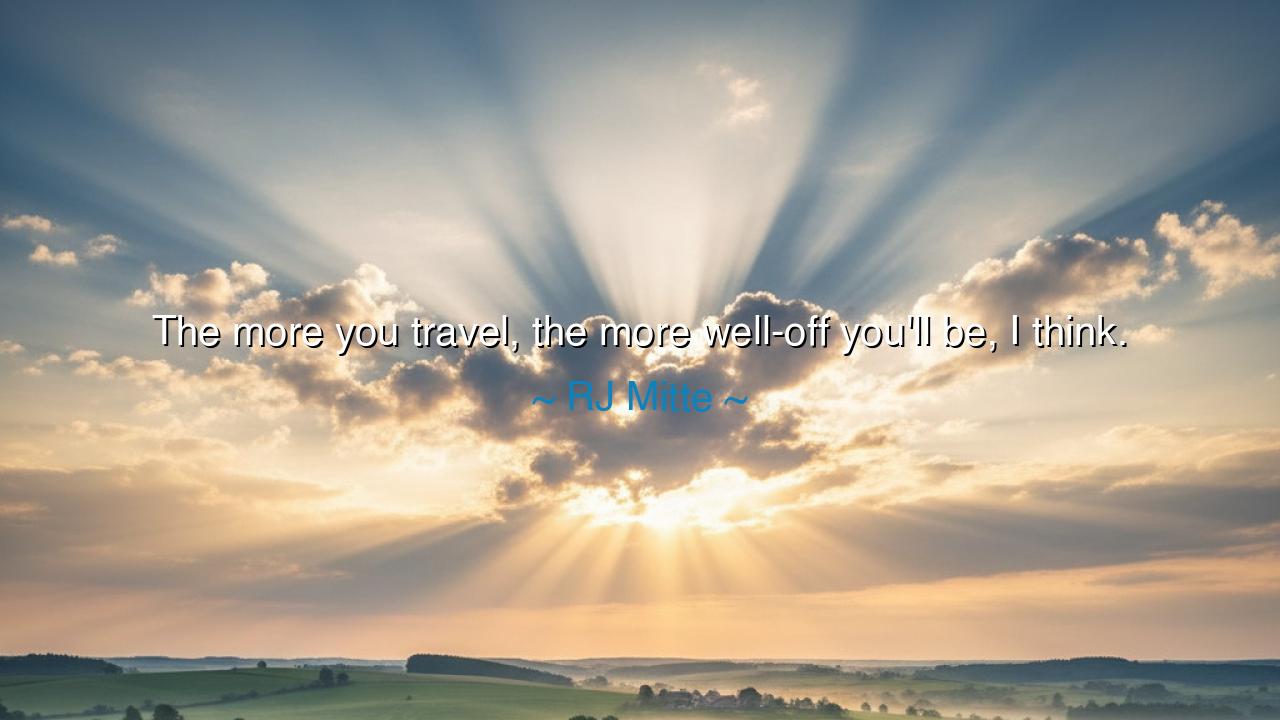
The more you travel, the more well-off you'll be, I think.






“The more you travel, the more well-off you’ll be, I think.” Thus declared RJ Mitte, and though his words seem plain, they hold a wisdom as ancient as the roads trodden by pilgrims, merchants, and wanderers since the dawn of civilization. For true wealth is not always counted in coins or possessions—it is counted in experience, in wisdom gained, in the richness of perspective. To travel is to enlarge the soul, to stretch the boundaries of the mind, and to return with treasures that no thief can steal and no rust can destroy.
When Mitte speaks of being well-off, he does not speak merely of material prosperity. He speaks of the fortune of the spirit, the wealth that comes from learning new ways, seeing new lands, and encountering lives unlike one’s own. A man who travels learns humility, for he sees that his own world is not the whole world. He learns empathy, for he meets faces that mirror his own struggles, though clothed in different garments. He learns resilience, for the road tests him with uncertainty, hardship, and surprise. Such riches, born of travel, cannot be measured, yet they endure in the heart forever.
History is filled with examples of this truth. Consider Marco Polo, who left Venice to journey across Asia, and in doing so brought back not only stories of emperors and wonders, but knowledge that would inspire generations of explorers. Or think of Ibn Battuta, who wandered for three decades across deserts and seas, learning the customs of far-off lands. He returned not with gold, but with wisdom that enriched his people for centuries. Their journeys prove Mitte’s words: the more one travels, the more one gains—not just outwardly, but inwardly.
Even the great philosophers understood this. Herodotus, the Father of History, wrote not only from the records of others, but from what he saw with his own eyes as he journeyed across Egypt, Persia, and Greece. His wisdom came from movement, from stepping into the world beyond the familiar. Likewise, the Stoics taught that a man who travels and observes gains a perspective that anchors him: he learns that nations rise and fall, that customs differ, yet that all men share the same humanity. This is the wealth of the traveler: a mind widened and a heart softened.
Yet there is also a hidden challenge in Mitte’s words. To travel is not only to move across geography, but to move across the inner barriers of the heart. Some travel far yet remain unchanged, clinging to the narrowness they carried from home. But those who open themselves—to wonder, to discomfort, to difference—are those who are truly enriched. Travel teaches not through the distance of miles, but through the openness of spirit.
The lesson for us is clear: if you wish to be truly well-off, seek not only possessions, but experiences that enlarge your soul. Walk beyond the familiar, whether across oceans or simply across the street into communities unlike your own. Let travel humble you, let it teach you, let it make you more human. For every journey carries within it a mirror, revealing not only the world, but yourself.
Practical wisdom flows from this teaching: make time to journey, even in small ways. Read the landscapes of your own land, listen to the stories of strangers, embrace cultures not your own. Do not travel only for leisure, but for learning. Carry curiosity as your provision, and humility as your compass. In this way, your wealth will grow—not in the vaults of banks, but in the treasure-house of the soul.
Thus let RJ Mitte’s words endure: “The more you travel, the more well-off you’ll be.” For wealth is not measured by what you keep, but by what you have encountered, absorbed, and carried in your heart. To travel is to live richly, to know deeply, and to return wiser than when you set forth. And such wealth, once gained, is the greatest inheritance you can leave to those who follow.






AAdministratorAdministrator
Welcome, honored guests. Please leave a comment, we will respond soon